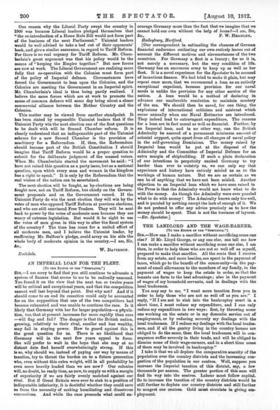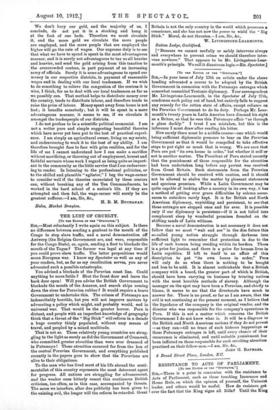THE LANDLORD AND THE WAGE-EARNER.
rTo THE EDITOR OF THE "SPECTATOR."] SIR,—How can I make a sacrifice without sacrificing some one else ? If Mr. Lloyd George, or any one else, can tell me how I can make a sacrifice without sacrificing some one else, I am then, in order to help those who are not so well off as myself, prepared to make that sacrifice. All the rents that I receive from my estate, and more besides, are spent in the payment of taxes, which go to the benefit of the community—in the pay- ment of small allowances to the members of my family, in the payment of wages to keep the estate in order, so that the tenants can farm to the best advantage ; also in the payment of wages of my household servants, and in dealings with the local tradesmen.
You may say to me, "I want more taxation from you in order to help those who are not so well off as you are." I reply, "If I am not to sink into the bankruptcy court in a short time, I must reduce my expenditure, and I can only reduce my expenditure in two ways : first, by throwing some one working on the estate or in my domestic service out of employment, or by reducing severely my dealings with the local tradesmen. If I reduce my dealings with the local trades- men, and if all the gentry living in the country houses are obliged to do the same, then the local tradesmen will in con- sequence suffer severely in their trade, and will be obliged to dismiss some of their wage-earners, and in a short time some of them may be involved in bankruptcy."
I take it that we all deplore the comparative scarcity of the population over the country districts and the increasing con- gestion of the population in our centres. Well, suppose you increase the Imperial taxation of this district, say, a few thousands per annum. The greater portion of this sum will find its way into the centres. Labour must follow capital. So to increase the taxation of the country districts would be still further to deplete our country districts and still further to congest our centres. Gold must circulate in giving em- ployment.
We don't bury our gold, and the majority of us, I conclude, do not put it in a stocking and hang it at the foot of our beds. Therefore we must circulate it, and the more gold we circulate the more people are employed, and the more people that are employed the higher will go the rate of wages. Our supreme duty is to see that what we have to spend is spent in the most advantageous manner, and it is surely not advantageous to tax us all heavier and heavier, and send the gold arising from this taxation to the overcrowded centres, in part payment of an increasing army of officials. Surely it is more advantageous to spend our money in our respective districts, in payment of reasonable wages and in dealing with our local tradesmen. If we wish to do something to relieve the congestion of the centres it is wise, I think, for us to deal with our local tradesmen as far as we possibly can. That method helps to distribute money over the country, tends to distribute labour, and therefore tends to raise the price of labour. Money spent away from home is not lost ; it benefits somebody; but it will be spent in a more advantageous manner, it seems to me, if we circulate it amongst the tradespeople of our districts.
I do not profess to be a scientific political economist. I am not a writer pure and simple suggesting beautiful theories which have never yet been put to the test of practical experi- ence. I am simply an agricultural owner, living on my estate, and endeavouring to work it to the best of my ability. I am therefore brought face to face with grim realities, and for the life of me I cannot understand bow I can make a sacrifice without sacrificing, or throwing out of employment, honest and faithful servants whose work I regard as being quite as import- ant to the community as the little service that I am endeavour- ing to render. In listening to the professional politician, or to the skilled and plausible " agitator," I beg the wage-earner to consider well if the theories enunciated by these orators can, without breaking any of the Ten Commandments, be worked in the hard school of a nation's life. If they are attempted and then fail, the wage-earner will surely be the greatest sufferer.—I am, Sir, die.,



































 Previous page
Previous page